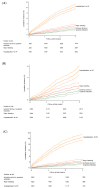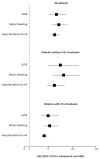Relative Importance of Heart Failure Events Compared to Stroke and Bleeding in AF Patients
- PMID: 33670912
- PMCID: PMC7957734
- DOI: 10.3390/jcm10050923
Relative Importance of Heart Failure Events Compared to Stroke and Bleeding in AF Patients
Abstract
Introduction: Incident heart failure (HF), ischemic stroke and systemic embolism (IS/SE), and major bleeding related to anticoagulation therapy are still the most frequent events occurring in patients with atrial fibrillation (AF). The aim of this study was to assess the 3-year incidence, predictors, and related mortality of IS/SE, major bleeding, and HF in a large cohort of AF outpatients.
Methods and results: We studied 4973 outpatients with prevalent AF included in the CARDIONOR registry. The mean age was 72.9 ± 11.2 years, 24.1% had diabetes mellitus and 78.9% had anticoagulant therapy at baseline. The mean CHA2DS2Vasc score was 3.4 ± 1.7. After a median follow-up of 3.2 years (IQR: 2.8 to 3.5), incident HF, IS/SE and major bleeding occurred in 10.5%, 3.3% and 2.1% of patients, respectively. When analyzed as time-dependent variables, IS/SE, major bleeding and hospitalization for decompensated HF were all strongly associated with mortality. The independent predictors of incident HF were age, women, hypertension, diabetes mellitus, coronary artery disease and a previous history of HF. A sensitivity analysis in patients without history of HF at inclusion revealed that incident HF remained the most frequent adverse event, occurring in 5.3% of patients, compared to IS/SE (1.7%) and major bleeding (2.5%).
Conclusion: HF is a common residual cardiovascular adverse event occurring in AF outpatients and is associated with a very high mortality. Since modifiable risk factors are associated with incident HF, upstream intensive management of these risk factors would be of interest.
Keywords: atrial fibrillation; bleeding; heart failure; stroke.
Conflict of interest statement
Lemesle reports personal fees from Amgen, Astra Zeneca, Bayer, Boehringer Ingelheim, Bristol-Myers Squibb, MSD, Mylan, Novartis, Pfizer, Sanofi-Aventis, and Servier. Lamblin reports personal fees from Actelion, Akcea, Amicus therapeutics, Bayer, Novartis, MSD, Pfizer, and Sanofi-Aventis and travel grants from Amgen and Bristol-Myers Squibb. Ninni, Meurice, Tricot, and Bauters had nothing to disclose.
Figures


References
-
- Magnussen C., Niiranen T.J., Ojeda F.M., Gianfagna F., Blankenberg S., Njølstad I., Vartiainen E., Sans S., Pasterkamp G., Hughes M., et al. Sex Differences and Similarities in Atrial Fibrillation Epidemiology, Risk Factors, and Mortality in Community Cohorts: Results From the BiomarCaRE Consortium (Biomarker for Cardiovascular Risk Assessment in Europe) Circulation. 2017;136:1588–1597. doi: 10.1161/CIRCULATIONAHA.117.028981. - DOI - PMC - PubMed
-
- Hindricks G., Potpara T., Dagres N., Arbelo E., Bax J.J., Blomström-Lundqvist C., Boriani G., Castella M., Dan G.-A., Dilaveris P.E., et al. 2020 ESC Guidelines for the diagnosis and management of atrial fibrillation developed in collaboration with the European Association for Cardio-Thoracic Surgery (EACTS): The Task Force for the diagnosis and management of atrial fibrillation of the European Society of Cardiology (ESC) Developed with the special contribution of the European Heart Rhythm Association (EHRA) of the ESC. Eur. Heart J. 2021;42:373–498. - PubMed
-
- Virani Salim S., Alonso A., Aparicio Hugo J., Benjamin Emelia J., Bittencourt Marcio S., Callaway C.W., Carson A.P., Chamberlain A.M., Cheng S., Delling F.N., et al. Heart Disease and Stroke Statistics—2021 Update: A Report From the American Heart Association. Circulation. 2021 doi: 10.1161/CIR.0000000000000950. - DOI - PubMed
LinkOut - more resources
Full Text Sources
Other Literature Sources
Research Materials
Miscellaneous

